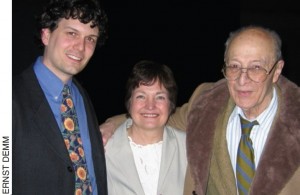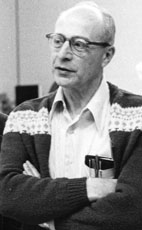
Prof. Eben Weitzman ’84 and Prof. George Lakey at the 2012 PJSA meetings
It was great to have the opportunity to meet Eben Weitzman ’84 at the Peace and Justice Studies Association meetings at Tufts University during the fall 2012 semester. Prof. Weitzman was sharing information at the meetings about programs in conflict resolution at the University of Massachusetts, where he teaches.
He has kindly written a blog post about his Swarthmore experience and his career in conflict resolution studies:
————————————————–
My experience at Swarthmore provided the foundation for the directions my life has taken, especially my work in peace and conflict resolution. The combination of Swarthmore’s roots in the Quaker tradition of commitment to peace and justice on the one hand, and its dedication to intellectual rigor on the other, spoke to me, inspired me, and gave me the tools I would need.
When I went looking for a Ph.D. mentor, I came across the great social psychologist Morton Deutsch—one of the founders of the field of conflict resolution—at Columbia University. Mort would often say that he was looking for people with soft hearts and hard heads. I think this is about as important an idea as any for those of us in the conflict resolution business, and Swarthmore had already done a lot to help shape me in this direction. Why soft hearts and hard heads?
Soft Hearts: If you work with conflict, chances are you do it because you care about something enough to do challenging, sometimes painful work. That’s good. The world needs more people like you.
Hard Heads: Here’s the tricky part. It’s good to be a softie. It’s good to let your caring and your compassion drive your work. But: Once you settle on a problem, now you have to think carefully, clearly, deeply, and systematically about the problem you’re trying to solve.
- You have to hold yourself to high standards.
- You have to subject your work to rigorous test, whether it’s empirical research or practice in the field.
- You have to be willing to accept answers you don’t like.
Because as much as the world needs more people who care, what the world needs even more is people who care, and who also have what it takes to do something about the things they care about. Swarthmore’s grounding in Quaker values, and its commitment to providing what I believe is one of the finest intellectual preparations you can find, is a perfect incubator for the soft-hearted, hard-headed people the world of peace and conflict resolution needs.
As a political science major at Swat with strong interests in psychology and philosophy as well, I had the opportunity to study political science with an eye on questions of justice, to learn about political philosophy, ethics, political psychology, cultural anthropology, and more. And as any Swat student knows, being surrounded by dedicated, committed, engaged, visionary fellow students was one of the most important parts of the whole experience. That’s one of the reasons both of my sons are studying there now.
I graduated from Swarthmore in 1984. Since then I’ve earned a Ph.D. in social psychology, and had the opportunity to work with labor unions and human rights NGOs, corporations and schools, hospitals, animal rescue networks, Federal disaster relief teams, and more. Right now I’m engaged with a project in Nigeria working on peace building between Christians and Muslims; a project here in Boston that provides dialogue channels between the federal law enforcement agencies and the local Muslim and Sikh communities; a group that uses the sport of Ultimate Frisbee (Go Earthworms and Warmothers!) to bring together Arab Israeli, Jewish Israeli, and Palestinian kids; a project to promote more effective teamwork in local hospitals; and a leadership development and strategic planning process with a local union.

The program is designed to provide students with the ability to understand, effectively manage, and intervene in conflict situations that arise among individuals and groups, locally and globally. Students explore the causes, dynamics, and consequences of conflict in a variety of settings; they learn techniques of conflict analysis and resolution, problem solving, and collaborative decision making; and develop skills in negotiation, mediation, dialogue and facilitation.
Within UMass Boston we are housed in the John W. McCormack Graduate School of Policy and Global Studies, a dynamic environment that houses three academic departments as well as numerous centers and institutes. These provide opportunities for students to participate in research and field projects locally and globally. Conferences and lectureships allow students to network with outstanding scholars and practitioners from a variety of fields.
Students come to our programs from six continents and more than thirty countries, bringing a wide range of backgrounds and a rich diversity of experience. Some are midcareer, while others arrive directly from undergraduate degree programs.
We have 2 current Fulbrights studying with us from abroad, and 8 new Fulbright applicants for the Fall!
Alumni of our programs are doing exciting and important things in a variety of settings; examples include:
Direct mediation services
United Nations ; World Bank
Superior Court of the District of Columbia
Metro-West Community Mediation
Ombuds offices
Princeton and Cornell Universities
National Institutes of Health
American Red Cross
Business and Non-Profits
eBay and PayPal (online dispute resolution)
Human Resources, Harvard Pilgrim Health Care
Mass General Hospital
Advocacy for Refugee & Immigrant Services for Empowerment
Ministry of Energy, Nigeria
Our beautiful campus on Boston Harbor offers our diverse student population both an intimate learning environment and the rich experience of a great American city.
I would love to hear from Swarthmore students looking for graduate study in conflict resolution, or even just curious to learn more about the field. Another good contact is our Associate Director, Roni Lipton roni.lipton (at) umb.edu
Please note that our deadline is fast approaching: it’s March 15!! If you are interested but may not be able to get things together by the deadline, please reach out to me directly and we’ll work with you.
Please also consider joining us in April for a 2-day symposium on Bridging Global Religious Divides, and consider submitting a paper for next October’s 10th Biennial Student Conference: “Conflict Studies: The Next Generation of Ideas.
I look forward to hearing from you!
Contact Information:
Eben A. Weitzman, Ph.D.
eben.weitzman (at) umb.edu
617-287-7238






